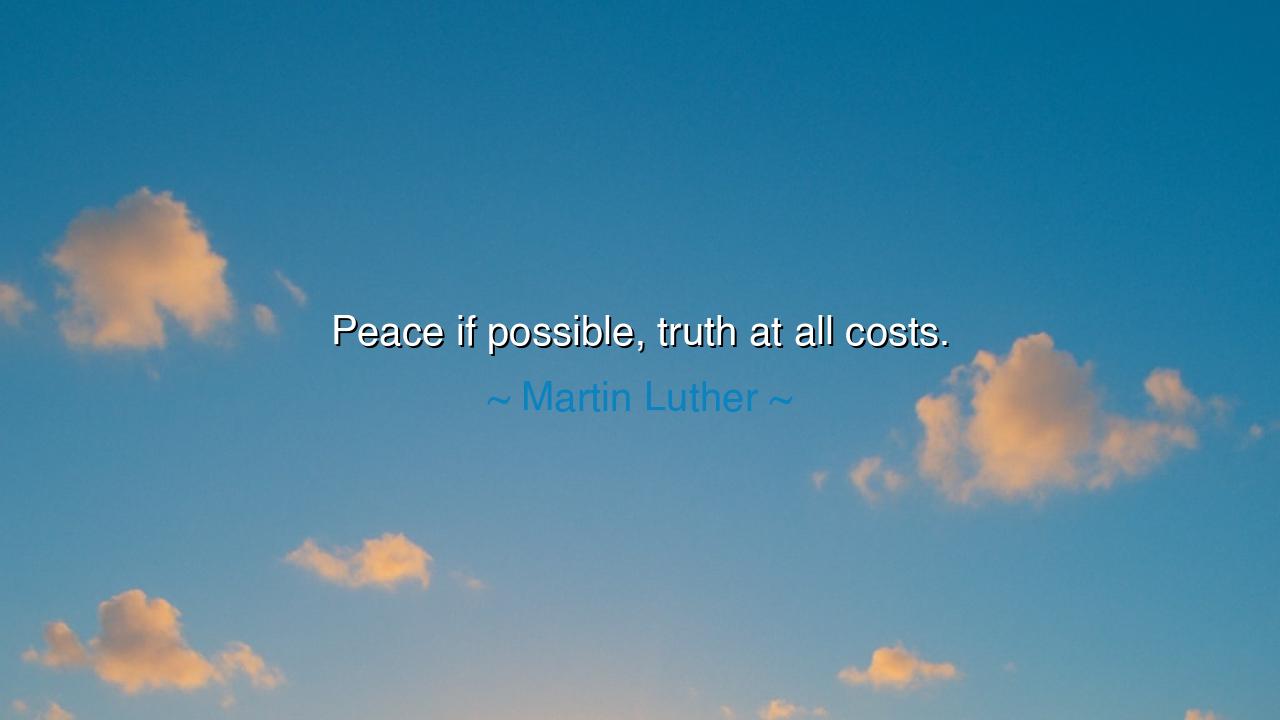
Peace if possible, truth at all costs.






Martin Luther, the great reformer whose words shook empires and shattered centuries of silence, once declared with thunderous clarity: “Peace if possible, truth at all costs.” In this short yet mighty saying lies a teaching that resounds through the ages: that while harmony among men is precious and desirable, it can never be purchased at the price of falsehood. For peace without truth is but illusion, and illusion is the seed of corruption. Truth, however costly, must always be held higher than comfort, higher than safety, even higher than life itself.
When Luther spoke of peace if possible, he acknowledged the natural yearning of the human soul for concord. War and division wound families, communities, and nations; peace is the balm that heals and allows life to flourish. Yet he warns us that peace is not the highest good if it demands the betrayal of truth. Peace must be sought, yes—but only insofar as it does not chain the tongue or blind the eyes. When peace can be found without sacrificing integrity, it is to be cherished. But when truth and peace stand in opposition, it is truth that must prevail.
This conviction was not idle philosophy but the very heart of Luther’s life. At the Diet of Worms in 1521, when he stood before emperor and bishops and was commanded to recant his writings, he refused. To submit would have secured peace with Rome, comfort for himself, and safety from persecution. But it would have meant the betrayal of conscience and the denial of truth. And so he uttered his immortal stand: “Here I stand; I can do no other.” In that moment, peace was shattered, but truth endured—and from that endurance, a new dawn broke upon Europe.
History offers many such examples. Consider Socrates, who could have preserved peace with Athens by remaining silent. Instead, he spoke truth until the city condemned him to drink hemlock. His death was not defeat but testimony that truth is worth more than life. Or consider Abraham Lincoln, who longed for peace but refused to allow the union to rest upon the lie of slavery. War followed, bitter and bloody, but through the crucible of truth, a deeper justice was forged. These lives confirm Luther’s cry: peace, though precious, must bow to truth.
The deeper wisdom of the quote is this: false peace is more dangerous than open conflict. For when lies are buried beneath a surface calm, they fester and grow until they explode in destruction. But when truth is spoken, even if it brings division, it purifies and strengthens. A household where grievances are ignored may appear peaceful, but its harmony is fragile and false. A nation that silences dissent may seem united, but its unity is a mask. Only when truth is faced, however painful, can real peace take root.
This teaching calls to each of us in our daily lives. It is easy to avoid conflict by keeping silent when injustice is spoken, by nodding when we should resist, by accepting falsehood to preserve outward harmony. Yet such “peace” is cowardice. The greater task is to speak truth with courage, even when it brings discomfort, even when it sets us at odds with those we love. For only then is peace truly worthy of its name: a peace founded not on silence, but on honesty, not on oppression, but on freedom.
So, O listener, let Luther’s words be etched upon your heart: “Peace if possible, truth at all costs.” Strive always for harmony, for gentleness, for reconciliation where it may be found. But never sell your soul for the appearance of peace. Speak truth, live truth, defend truth—though it cost you comfort, friendship, or even your life. For in the end, peace without truth is a shadow, but truth, even amidst strife, is a light that no darkness can overcome.






AAdministratorAdministrator
Welcome, honored guests. Please leave a comment, we will respond soon